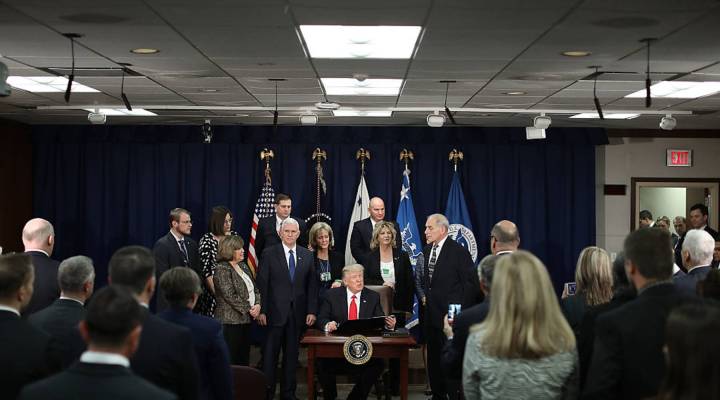
Why President Trump will keep lobbyists especially busy

In Washington, D.C., K Street is an icon of American lobbying. Lots of lobbying firms are located there.
Lee Drutman, a senior fellow at New America who studies lobbying, pointed out the offices of prominent K Street lobby shops and told what’s happening behind the glittering windows lining the street. Things are hopping. Like in the beginning of any congressional session, lobbyists are working members of Congress, encouraging them to pass certain bills or vote against others.
One reason lobbyists are especially busy though? Drutman said the Donald Trump administration has given lobbyists a new mission.
“If you never know when President Trump is going to send out a grumpy tweet that puts your company in the spotlight, you want to make sure you have lobbyists who are building relationships with his administration so that he doesn’t take any serious action to harm your company,” Drutman said.
Drutman said lobbyist offices are everywhere.
“They just basically stretch down toward Capitol Hill — stretch east down I street and F street and G street,” he said, pointing.
In fact, the lobbying corridor stretches all the way into Fairfax, Virginia, where lobbyist Paul Miller has his office. He represents mainly small businesses.
Here’s what a lobbyists’ life is like right now: Miller said he’s been working 15 or 16 hour days, introducing himself to new members of Congress and lobbying to repeal the Affordable Care Act.
“We’ve had already six bills introduced,” he said. “We’ve had one bill go to the floor and pass. That’s faster than most sessions.”
Part of the reason for the speed? For the first time since the election of 2010, one party controls both Congress and the White House. Lobbyists are scrambling to keep up with Republicans.
But Trump wants to rein them in. He said anyone who serves in his administration can’t lobby for five years after leaving. But Miller said the ban will be tough to enforce. People will still lobby, they just won’t register with the government.
“I call it the shadow lobbying community,” Miller said. “They know who they are. It’s not new. It’s been happening for years. That’s the real issue that needs to be addressed.”
Over on Capitol Hill, Craig Holman is a lobbyist who lobbies against lobbying for the left-leaning watchdog group Public Citizen. He wants stronger laws on conflicts of interest in Congress and in the Trump administration. He’d like a ban on working lobbyists taking jobs in government agencies.
“So that, essentially, you don’t see corporations capture the regulatory agencies by placing their lobbyists or CEOs on those agencies that oversee them,” he said.
Holman said he’s afraid Washington will return to the era of Jack Abramoff, a lobbyist at the center of a massive corruption scandal in the mid-2000s. Holman said ever since then, lobbyists have been vilified.
“You know, I’m a registered lobbyist, and I’m proud of the work I do for Public Citizen,” he said, laughing. “But even my own mother won’t tell her neighbors that I’m a registered lobbyist.”
Back on K Street, Drutman said even with all of the talk of bans and crackdowns, lobbyists will still be out in full force, spending record amounts of money to persuade members of Congress to oppose or support legislation.
“I wouldn’t be surprised if we saw lobbying hit $4 billion in 2017,” he said.
And Drutman said that’s just from registered lobbyists. If you counted all of the unregistered people who lobby, that number would double.
There’s a lot happening in the world. Through it all, Marketplace is here for you.
You rely on Marketplace to break down the world’s events and tell you how it affects you in a fact-based, approachable way. We rely on your financial support to keep making that possible.
Your donation today powers the independent journalism that you rely on. For just $5/month, you can help sustain Marketplace so we can keep reporting on the things that matter to you.












